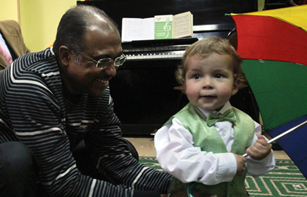
UNAIDS Executive Director Michel Sidibé (left) plays with a two-year-old boy at a specialized centre for children living with HIV near St Petersburg, Russia.
On the first of a four-day mission to the Russian Federation, UNAIDS Executive Director Michel Sidibé and UNAIDS Goodwill Ambassador James Chau visited a specialized HIV clinic near Saint Petersburg that cares for children who have been orphaned by AIDS and pregnant women living with HIV. The UNAIDS delegation toured the facility with its chief physician, Dr Evegeny Voronin, a leading AIDS expert in Russia.
“We receive children from all over Russia—mainly, the most severe cases of HIV infection,” said Dr Voronin, head of the Centre for Prevention and Treatment of HIV Infection in Pregnant Women and Children. “The overall strategy is that children are treated in their place of residence and sent to us only when there is no other choice,” he added.
Providing high quality treatment is just half the battle, says Dr Voronin. After addressing a child’s medical needs, he and his team of social workers turn their attention to the social and psychological environment—crucial elements in the health and development of any child, particularly one living with HIV.
“Here at the Centre, we try to do everything we can so that the children don’t feel different from children in families,” said Dr Voronin, adding that his team encourages the children to dance, play music and participate in group activities to help them become more socially engaged. “But this Centre will never be a substitute for a real family,” he said.
Here at the Centre, we try to do everything we can so that the children don’t feel different from children in families. But this Centre will never be a substitute for a real family
Dr Evegeny Voronin, head of the Centre for Prevention and Treatment of HIV Infection in Pregnant Women and Children
During their tour of the Centre, Mr Sidibé and James Chau were treated to a musical performance by five pre-school age girls and one male toddler. “Being here gives me great hope,” said the UNAIDS Executive Director. “When they first came to this Centre, many of the children were unwell and couldn’t speak. Now they are dancing, singing, healthy and thriving,” he said.
According to government statistics, an estimated 5200 children under the age of 15 were living with HIV in the Russian Federation in 2010. More than 22% of children living with HIV are orphans or have been left behind without parental care.
Perceptions around HIV slowly shift
Dr Voronin notes that in Russia’s larger cities, social stigma towards people living with HIV is less pronounced than in remote regions of the country, as people tend to have access to more information. “Here in St Petersburg, HIV is not a rare disease—there are more than 40 000 people living with HIV,” he told the UNAIDS delegation. “People recognize that HIV-positive people are the same as everyone else.”
As HIV becomes more widely understood and accepted in Russia, the number of adoptions of children living with HIV is on the rise, says Dr Voronin. Five years ago, he says, only 10 out of 350 abandoned children were adopted in Russia—mainly by employees at his Centre or people of religious faith. Today, 100 per cent of girls under the age of seven at the Centre are adopted by families.
“These children are sons and daughters,” said James Chau, a well known television personality in China who works with UNAIDS on stigma and discrimination issues. “If we succeed in breaking the last barrier—social stigma—we will turn a fundamental corner in the HIV response. I am incredibly encouraged by what I see at Dr Voronin’s Centre.”
Preventing new HIV infections in children
In addition to caring for children living with HIV, the centre works to prevent new HIV infections. “Over the past two years, we have achieved zero per cent transmission of HIV from mother to child among 300 women seen at our centre,” said Dr Voronin.
He noted, however, that about 15% of pregnant women living with HIV across Russia seek treatment too late in their pregnancies—immediately before or during labor—and give birth to about 50% of all HIV-positive children in the country.




